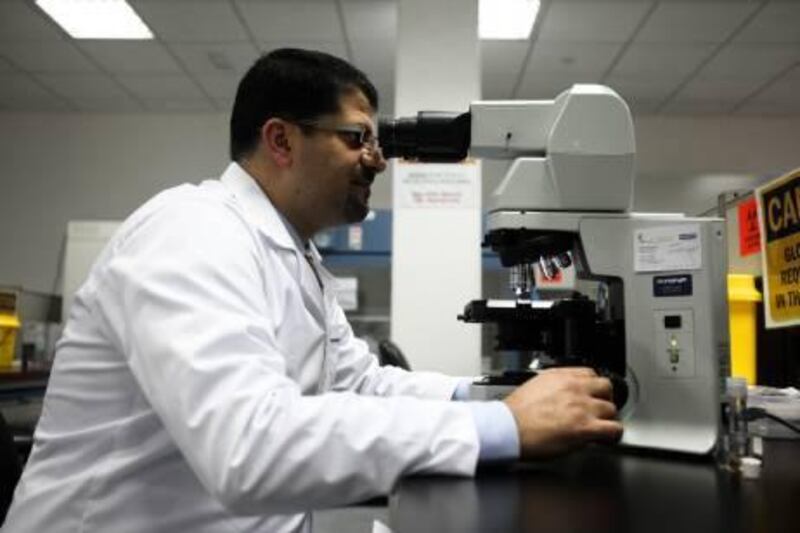ABU DHABI // Doctors in the capital will have access to wider, faster and more effective means of testing for diseases with the official launch of the National Reference Laboratory.
The lab, which offers more than 4,000 tests, some of which had not been available in the emirate, aims to increase the level of care being delivered to patients, said Suhail Mahmood Al Ansari, the executive director of Mubadala Healthcare, a division of the government-owned strategic investment company Mubadala.
"It has been established to meet the growing demands of Abu Dhabi's healthcare needs," said Mr Al Ansari. "Our intent is to increase the spectrum, coverage and efficiency of lab testing in the region."
Labs up and running at the Musaffah centre include microbiology, haematology, immunology and toxicology, said Dr Hazim Najjar, the director of the molecular diagnostics lab.
"This is one of the unique laboratories," Dr Najjar said. "In this lab we have two special features, one of which is the introduction of the new version of hepatitis B molecular testing."
Hepatitis B and C and HIV can be diagnosed using different methods of molecular diagnostic testing, he said, but the most recent type of testing had not been introduced to the emirate until now.
Other technology exclusive to the laboratory includes a machine to test for sexually transmitted diseases such as the human papilloma virus infection, chlamydia trachomatis and neisseria gonorrhoeae.
Molecular diagnostic testing is faster than conventional tests, said Dr Najjar.
"For example, a tuberculosis culture can take about six to eight weeks to give a result but if we do detection by the molecular diagnostic test we can get a result in a few hours," he said.
David King, the president and chief executive of the medical test provider LabCorp, said time and money could be saved by offering the tests, which is imperative for disease management.
"It is well known that laboratory results are the vital information that physicians rely on in 70 per cent plus of healthcare decisions," Mr King said, citing research conducted by the American Clinical Laboratory Association last year.
"In the old days the laboratory asked if you had an infection, but now the laboratory spans the entire range of medical care."
Lab tests allow doctors to offer better screening, prevention, identification of diseases and treatment for patients, Mr King added.
More effective medical diagnostic testing, which determines the presence of disease, will strengthen people's trust in the healthcare system, said Mr Al Ansari.
"It has a very strong effect on the decisions physicians make when it comes to delivering care to the patient," he said.
"The accuracy of the testing information they get will lead to [more] accuracy and efficiency of the treatment plans they ultimately deliver to their patients."
Demand from doctors and patients for better services has left laboratories with no choice but to upgrade and improve services, he said.
"We've got to understand that not only patients but physicians have a desire and a growing need and demand for an improvement in the quality and the accessibility to the various kinds of tests that they require to better perform their duties," Mr Al Ansari said.
"This is exactly what we are here to deliver upon."






